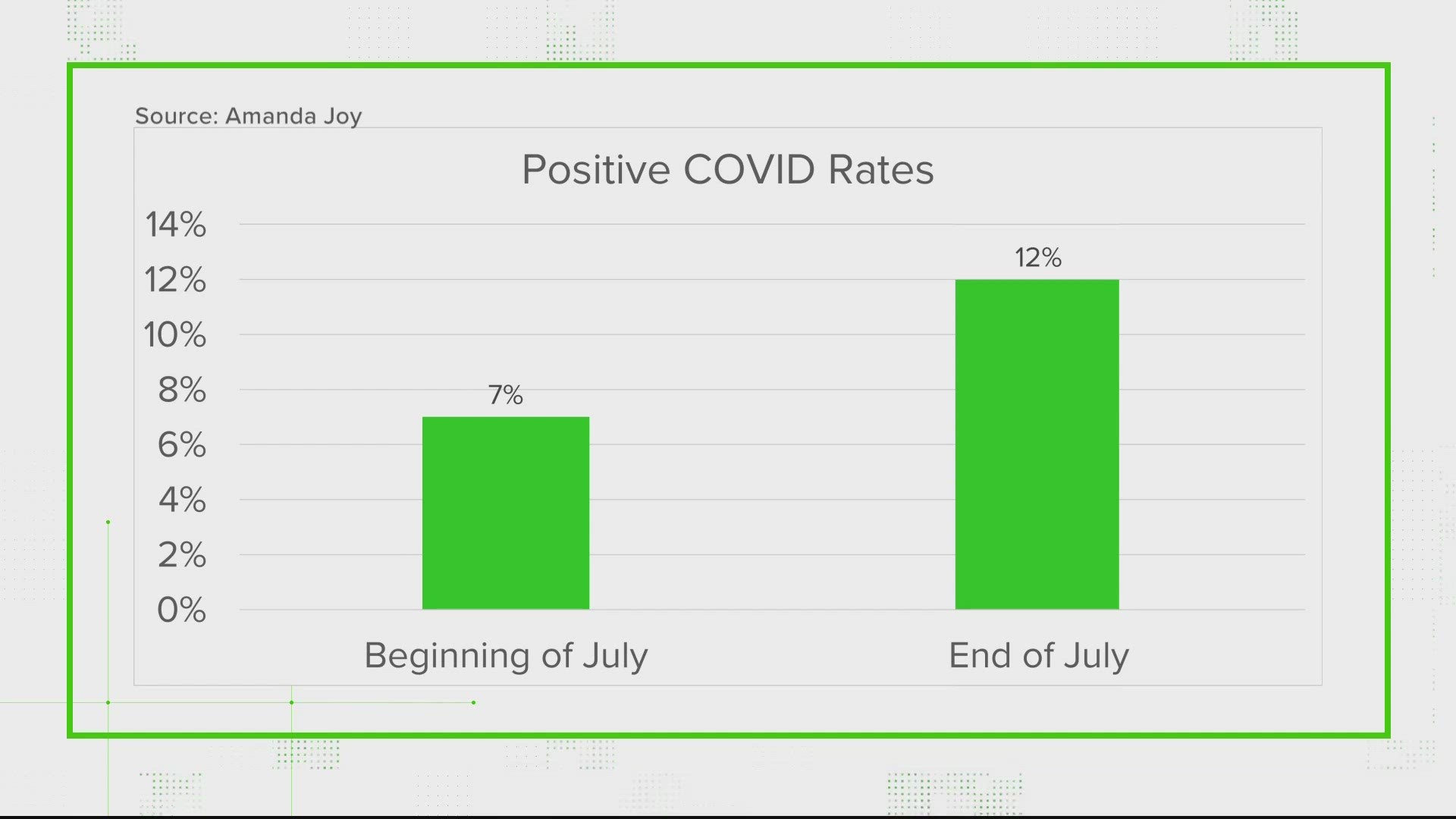WASHINGTON — The Centers for Disease Control and Prevention's latest COVID-19 reports have people feeling apprehensive about a new summer COVID surge. The data shows there were just over 8,000 people that went to the hospital for COVID from July 9 to July 15. That's a 24% increase from the reported 6,464 hospital cases on July 1.
People want to know if the DMV is following a similar trend.
The Question
Are COVID-19 cases increasing in the DMV?
The Sources
The Answer
Yes, COVID-19 cases increased in July.
What We Found
All our sources agree that COVID-19 cases are increasing in the DMV, but they all have different ways of reporting those cases.
MedStar Health provides health services to residents all across the DMV. The track COVID, flu and strep cases in 33 urgent cares around the area.
Amanda Joy is the director of advanced practice for MedStar Health Urgent Care. She told WUSA9 via Zoom that there has been an increase in positive COVID cases in Medstar's urgent cares.
"In the week ending on July 2, we have a positive COVID rate of 7%," Joy said. "The week ending the 23rd, it was up to 12% point of care positivity rate for COVID. We are definitely seeing a near double increase for COVID in the positivity for these COVID tests."
These numbers mean that 12% of all the COVID tests taken at the 33 urgent cares came back at positive for the infectious disease. The data from D.C., Maryland and Virginia government's COVID websites tell a similar story.
The District of Colombia reports its COVID-19 weekly case rate per 100,000 population. On July 1, D.C. reported a 4.8 weekly case rate. This increased to a 6.2 weekly case rate on July 15.
Maryland reports their cases in a similar way with a seven-day moving average case rate per 100,000 population. The state reported a 0.95 rate for the week ending on July 1, and a 1.62 rate for the week ending on July 24.
Virginia reports the number of cases in the state weekly. On July 1, Virginia reported 1,239 new cases that week. On July 22, that weekly number increased to 1,522 cases across the state that week.
All three locations show slight increases throughout the month of July, but these numbers are much lower than last summer's.
For the week ending on July 16, 2022, the D.C. weekly rate was 207.2. In Maryland, the seven-day moving case rate was 23.64. Virginia reported 2,989 new cases that week.
The number of COVID cases needing further hospital treatments has also remained low. The CDC reports new COVID-19 admissions into hospitals weekly through a rate per 100,000 people. In both D.C. and Virginia the rate was 1.6 and in Maryland, it was 1.5. This means that from July 16 to July 22, there were only 1.5 and 1.6 COVID cases in hospitals for every 100,000 people. This is much lower than the national average of 2.62.
The numbers for this month aren't a great predictor of what the next month could look like, but Amanda Joy says she wouldn't be surprised to continue to see numbers rise.
“We know COVID’s not going away and it’s going to be much like the seasonal flu where we have these ebbs and flows and hopefully it’ll have more of a predictable seasonality to it eventually, but it’s difficult to predict but we knew it was going to come again at some point," Joy said. "I am a little surprised it’s earlier in the summer. We expected it more in the fall time."
Experts tend to look at how COVID cases are doing in other parts of the country to predict what trends in the U.S. might look like.
"This particular variant we see surging now was surging in December of 2022 in India," Joy said. "Often, we follow these patterns from Asia, Europe and Australia."
For most people, COVID will only result in flu-like symptoms, but Joy says it's important to still get tested and protect the community from further spreads by "heading back to basics."
“I think because everybody feels like COVID is gone, we have certainly been more lax with things like frequent handwashing and social distancing and we’re traveling more, having more gatherings, and I think that’s just increasing the rate of exposure,” Joy said.

